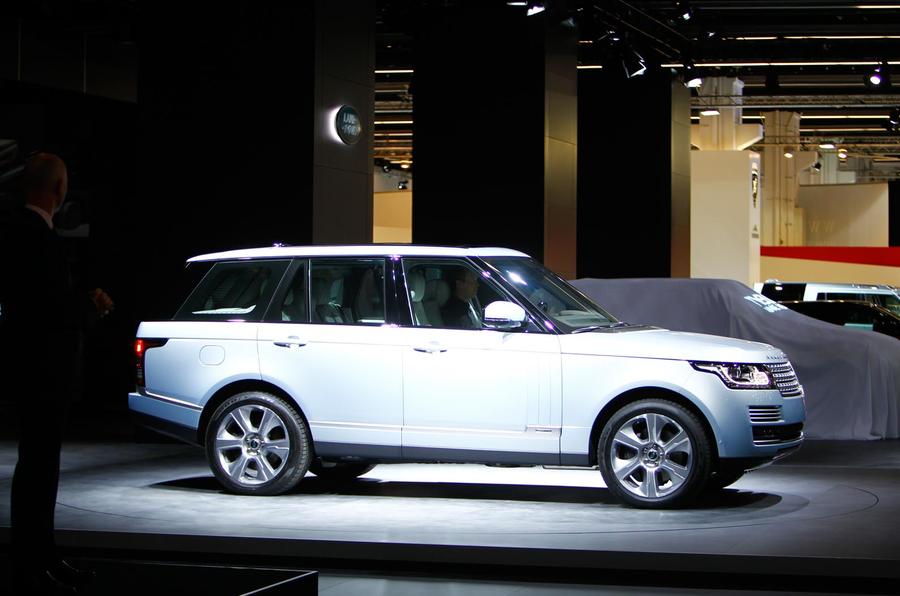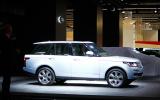New hybrid versions of the Range Rover and Range Rover Sport have been revealed at the Frankfurt motor show, with claims of spectacular economy gains, “staggering” performance, uncompromised comfort and even better refinement than conventional diesel and petrol Range Rovers.
Land Rover dealers will start taking orders from 10 September and the first cars are scheduled to go to their owners early next year. Manufacturing is understood to be starting very soon.
To prove the new hybrid models, which are claimed to deliver similar levels of off-road capability and durability to conventional models, Land Rover is planning a 10,000-mile expedition called ‘2013 Silk Trail’. This will follow ancient trading routes running through 12 countries from France to India, via Poland, Russia and China, and reaching the Mumbai HQ of Jaguar Land Rover’s parent company, Tata Motors, in mid-October.
The hybrid system for both models combines the Range Rover’s familiar TDV6 diesel and a 35kW electric motor integrated with the eight-speed ZF automatic gearbox to create a powertrain with peak power of 335bhp and 516lb ft of torque.
The entire hybrid system, including its lithium ion battery, adds less than 120kg to the models’ kerb weights, considerably less than the weight saving Land Rover achieved by converting both models to all-aluminium body/chassis construction.
The two hybrid models’ kerb weights are similar (2372kg for the Sport, 2394kg for the Range Rover) so their claimed performance and economy figures are close to identical.
With V6 diesel and electric motor in full swing, the Sport is marginally faster, with a 140mph top speed (Range Rover 135mph) and its 0-60mph acceleration of 6.7sec beats the larger model by 0.2sec.
Both hybrid models return 44.1mpg on the combined cycle and emit just 169g/km of CO2, a 16 per cent reduction against a conventional Range Rover TDV6.
Each model delivers practical inner-city performance up to a 30mph top speed for about one mile when in their driver-selectable electric-only mode (the motor’s peak torque is 125lb ft) and there is a regenerative system that harvests kinetic energy when the car is coasting or braking.
There is no packaging compromise, either. Both models are available with full-sized spare wheels and the standard Sport’s 5+2 accommodation is offered in the hybrid as normal.
“We are very excited to be introducing these models,” said Land Rover global brand director John Edwards. “They’re the world’s first hybrid 4x4s with true Land-Rover-level off-road capability.”




















Join the debate
Add your comment
Good
Great tech, makes these behemoths - once hated by the greens, into a vehicle a green might now consider...maybe?
In the real world
What's the point of any vehicle being able to do only 1 mile on elec power, have people forgot that it's possible to walk ?.
Will take a while to recover the extra outlay.
Don't get me wrong, I really like the RR and they should be praised for the ethos of weight reduction (from just under 3 tonnes to well over 2 tonnes!) but like a lot of hybrid systems, they are designed with the EU economy test at the fore. 1 mile on electric alone is rubbish in the real world, but will make a significant difference on the very short EU test. I guess part of the reason is that they didn't want to put a lot of extra mass on the vehicle with the batteries. Also seems very steep: at current prices, and if you achieved the claimed figure you would recoup the outlay (in diesel costs) after 1.09 million miles!
I can't help thinking that the best overall real world solution at the moment is the volvo XC60 diesel hybrid. Has a plug in charger and will do 30 ish miles on electric alone. And is about 40% of the price of this. Of course, you don't by a £100k RR because you've decided you want a hybrid.
TeutonicDiesel wrote: I
Great. Only problem is that the XC60 diesel plug-in hybrid is a concept.
Plus the 30 miles EV range is over that same EU test that you slagged off for fuel economy testing...
Meant V60.
Not sure I was slagging off the EU test cycle, although it is flawed. In any case, the EV range is not favourably improved by the EU test, it is effectively a function of the batteries - more batteries = further. Not difficult is it?
TeutonicDiesel wrote: Not
As they all are.
Totally agree. But that is the fundamental difference between a HEV & a PHEV. HEVs are not really designed to have an EV range, more as a supplamental assist. The biggest problem with PHEVs is the additional weight on top of the HEV for the batteries.